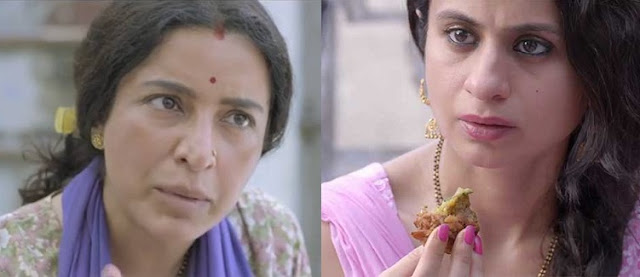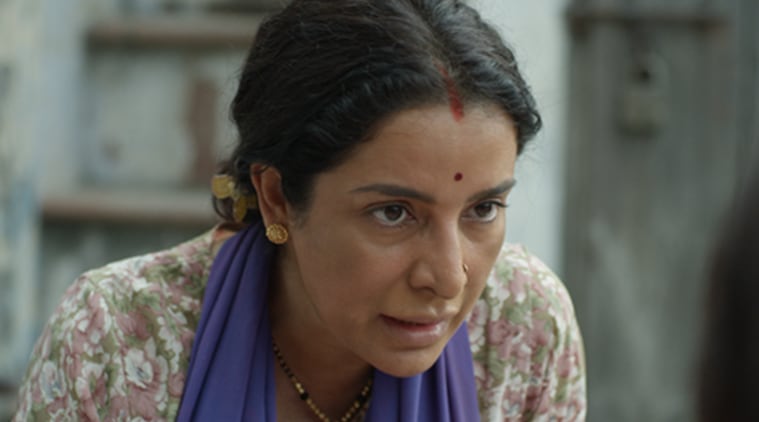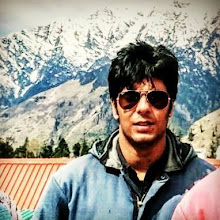What is a short film, I ask you?
Today I seize this opportunity to analyse and applaud something I never ventured to consider for an opinion before, since it used to lie outside a comparatively more mainstream market of the conventional 'movies' which preemptively meant Hollywood or Bollywood. Short films fleet past us because they are small, both in length and project size, and are much less promoted than theatrical cinema. But this medium has grown to become a powerful storytelling medium, owing to strong, taut narratives, perfectly unsaturated in the stimuli to which they desire us to react.
 Today I came across Chutney, a 16-minute long short film produced by Tisca Chopra who also co-wrote it with Jyoti Kapur Das, the director. A few lines ahead, is provided an analysis into some plot and character points that I believe make this project stand out unlike any recent cinematic indulgence.
Today I came across Chutney, a 16-minute long short film produced by Tisca Chopra who also co-wrote it with Jyoti Kapur Das, the director. A few lines ahead, is provided an analysis into some plot and character points that I believe make this project stand out unlike any recent cinematic indulgence.
 Moving on then, to the first question that crossed me while seeing this: CAN YOU BELIEVE THAT IS TISCA CHOPRA IN THE LEAD? We have witnessed some amazing character development in some really amazing films, and one is just left awestruck to see Tisca portraying in such a raw, beautiful manner. But here, the reason that her entity here stands out, lies much in the physical persona of Tisca's character i.e. the Ghaziabadi Didi (we shall refer to her as 'Didi' henceforth' considering the character's name isn't revealed) serving the eponymous chutney. Due credit to Prem Singh and Mithu Santra, the makeup and hair guys behind this.
Moving on then, to the first question that crossed me while seeing this: CAN YOU BELIEVE THAT IS TISCA CHOPRA IN THE LEAD? We have witnessed some amazing character development in some really amazing films, and one is just left awestruck to see Tisca portraying in such a raw, beautiful manner. But here, the reason that her entity here stands out, lies much in the physical persona of Tisca's character i.e. the Ghaziabadi Didi (we shall refer to her as 'Didi' henceforth' considering the character's name isn't revealed) serving the eponymous chutney. Due credit to Prem Singh and Mithu Santra, the makeup and hair guys behind this.
Didi oozes such innocent, earthy and dangerous elements which can be easily be understood as the very embodiment of the evils let loose upon the world from Pandora's box. The entire story develops to send a spine-chilling message to a woman, played by Rasika Dugal quite evidently hitting it off somewhat objectionably with Didi's husband Virji i.e. Adil Hussain.
 Sumit Gulati, who plays Munna must be careful though. After a portrayal or 2 more of such sleazy, disgusting servant type characters, I genuinely hope he doesn't get typecast as one. For those who couldn't guess, this is an absolute compliment toward his acting skill, which we have been subject to earlier in movies such as Talvar (2015).
Sumit Gulati, who plays Munna must be careful though. After a portrayal or 2 more of such sleazy, disgusting servant type characters, I genuinely hope he doesn't get typecast as one. For those who couldn't guess, this is an absolute compliment toward his acting skill, which we have been subject to earlier in movies such as Talvar (2015).
If filmmaking is a drug, a short film's cocaine <Eric Clapton crooning in the background>.
Today I seize this opportunity to analyse and applaud something I never ventured to consider for an opinion before, since it used to lie outside a comparatively more mainstream market of the conventional 'movies' which preemptively meant Hollywood or Bollywood. Short films fleet past us because they are small, both in length and project size, and are much less promoted than theatrical cinema. But this medium has grown to become a powerful storytelling medium, owing to strong, taut narratives, perfectly unsaturated in the stimuli to which they desire us to react.
 Today I came across Chutney, a 16-minute long short film produced by Tisca Chopra who also co-wrote it with Jyoti Kapur Das, the director. A few lines ahead, is provided an analysis into some plot and character points that I believe make this project stand out unlike any recent cinematic indulgence.
Today I came across Chutney, a 16-minute long short film produced by Tisca Chopra who also co-wrote it with Jyoti Kapur Das, the director. A few lines ahead, is provided an analysis into some plot and character points that I believe make this project stand out unlike any recent cinematic indulgence.Before you read any further, please first see 'Chutney' in the link below, if you haven't already, and then read on and express how much you're able to relate with the write-up:
Done? Seen it? Okay.
 Moving on then, to the first question that crossed me while seeing this: CAN YOU BELIEVE THAT IS TISCA CHOPRA IN THE LEAD? We have witnessed some amazing character development in some really amazing films, and one is just left awestruck to see Tisca portraying in such a raw, beautiful manner. But here, the reason that her entity here stands out, lies much in the physical persona of Tisca's character i.e. the Ghaziabadi Didi (we shall refer to her as 'Didi' henceforth' considering the character's name isn't revealed) serving the eponymous chutney. Due credit to Prem Singh and Mithu Santra, the makeup and hair guys behind this.
Moving on then, to the first question that crossed me while seeing this: CAN YOU BELIEVE THAT IS TISCA CHOPRA IN THE LEAD? We have witnessed some amazing character development in some really amazing films, and one is just left awestruck to see Tisca portraying in such a raw, beautiful manner. But here, the reason that her entity here stands out, lies much in the physical persona of Tisca's character i.e. the Ghaziabadi Didi (we shall refer to her as 'Didi' henceforth' considering the character's name isn't revealed) serving the eponymous chutney. Due credit to Prem Singh and Mithu Santra, the makeup and hair guys behind this.Didi oozes such innocent, earthy and dangerous elements which can be easily be understood as the very embodiment of the evils let loose upon the world from Pandora's box. The entire story develops to send a spine-chilling message to a woman, played by Rasika Dugal quite evidently hitting it off somewhat objectionably with Didi's husband Virji i.e. Adil Hussain.
The narration of this tale can be called nothing short of a play straight out of Tarantino's style of filmmaking, though it is more elucidative, with backstory sequences leaving nothing to the viewer's imagination, and simply serving up a dish merely for the tasting (ergo: Chutney). With an extremely well matched group of actors, including the supporting female Rasika Dugal, this is one well made dish (I love how this film's title plays with my habit of comparing films with food).
An element in the story I wish to comment upon exclusively, is one which would have gone largely unnoticed by the majority viewership - the servant. Not Bhola, the boy brought up by the lead couple and then buried unceremoniously by Didi. Not him.
I refer to Munna. Yes Munna, who hurls food into his masters' and guests' trays, who spits in their drinks, who smokes in their presence, and sings 'Lollipop lagelu' behind the backs of female guests. Superficially off-putting, and seemingly inconsequential, he is quite in contrast to Bhola, the shy boy who served dutifully and made delicacies for his masters.
But is the entity of Munna merely a servant, a simple manifestation of the negativity lingering around the household in the film? What if it is the continuance of the entity that was Bhola, which has found refuge in Munna's facade?
All the while, alongside Didi's tale of Bhola, Munna's antics are a running device, which are subtly drawing a comparison between his self and the picture of Bhola being painted by Didi. Bhola is shown as a hardworking boy, who provides a heartfelt service to his masters and acts humbly and always in a manner seemingly expected from a good servant. If one observes Munna's actions, they aren't merely of some character who is twisted just for the fun of it, but of someone who has been scorned at the hands of the people toward whom he behaves so i.e. Didi and Virji.
The food of the house, and the chutney are made from items grown in the house itself, specifically on the Bhola's grave. Stands to reason, the food is soiled in the negativity with which Bhola died, and contains a part of him. Munna's character exists as a specimen, a victim even, of this food, who subconsciously houses the scornful side of Bhola, which reflects all too well in his callous attitude, specifically apparent at 8:15 in the video above, where though Munna abuses Bhola, at closer observation, it seems to be more of a self reprimand by his subconscious Bhola.
 Sumit Gulati, who plays Munna must be careful though. After a portrayal or 2 more of such sleazy, disgusting servant type characters, I genuinely hope he doesn't get typecast as one. For those who couldn't guess, this is an absolute compliment toward his acting skill, which we have been subject to earlier in movies such as Talvar (2015).
Sumit Gulati, who plays Munna must be careful though. After a portrayal or 2 more of such sleazy, disgusting servant type characters, I genuinely hope he doesn't get typecast as one. For those who couldn't guess, this is an absolute compliment toward his acting skill, which we have been subject to earlier in movies such as Talvar (2015).
What are your opinions and observations about the plot, the characters, and other elements of this little film? Do you agree, disagree or are you just <meh>? Do share with me below.


